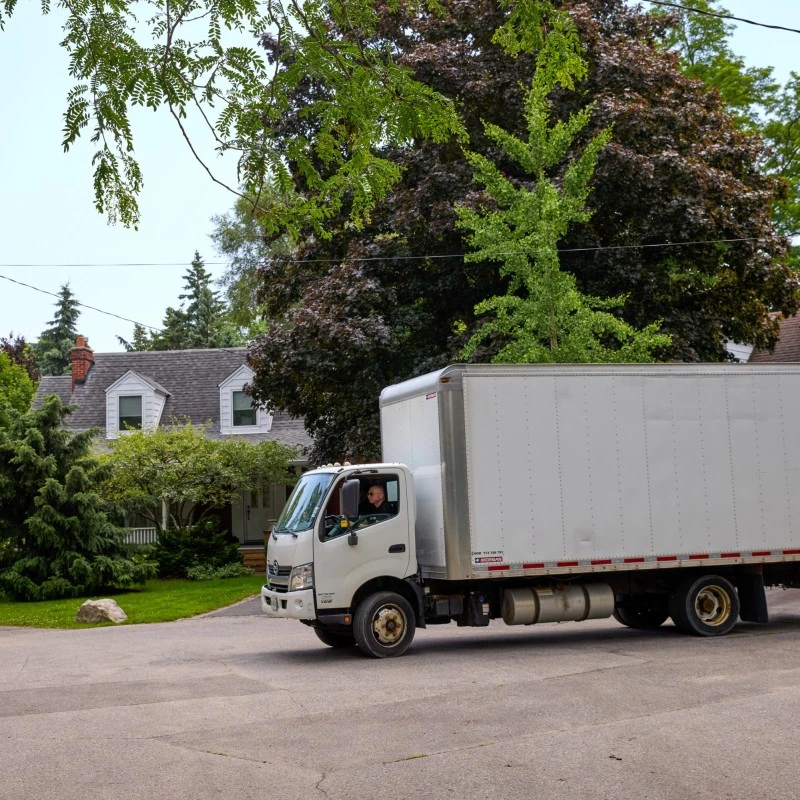Moving checklist and relocation guide in Vancouver


Vancouver is a celebrated city, both within Canada and globally. It offers the perfect balance of urban metropolitan living, multicultural diversity, and easy access to mountains, beaches and rainforests, with a mild temperate climate adding to its appeal.
The city’s thriving film, tech, tourism and tech industries, combined with some of the world’s best post-secondary options, attract people from all over the world.
If you are considering a move to Vancouver, the proper research and planning will make your life a whole lot easier and moving day more efficient and affordable.
This guide provides helpful tips and suggestions for the entire moving process from start to finish, including insights into Vancouver living. From checklists to budgeting, packing to cleaning and beyond, the moving-day details are here.
Introduction to moving day in Vancouver
 Timing is important when planning your big move. Summer months are busy for Vancouver moving companies. This is especially the case during August and September, when students arrive or return to the city in preparation for the school year. If you plan to move in the summer, book your moving company well in advance.
Timing is important when planning your big move. Summer months are busy for Vancouver moving companies. This is especially the case during August and September, when students arrive or return to the city in preparation for the school year. If you plan to move in the summer, book your moving company well in advance.
Vancouver is a sprawling city whose roads and freeways become hectic during rush hours from 7 am to 10 am and 4 pm to 7 pm. While the city’s excellent public transport system takes some pressure off of navigating traffic, it's good to be aware of heavy traffic times while planning your moving schedule. Map out your route mindfully to streamline your trips while avoiding congested intersections. Parking (especially downtown) can be challenging, so secure a temporary parking permit if available.
Vancouver ranks fourth on the list of Canada’s top ten rainiest cities—with adjacent Abbotsford ranking second. If you are moving outside of the warmer summer months, you'll need to adjust to the weather. Fog, sudden downpours and storms are common, so be prepared for slower travel times. Make sure your belongings are covered and won’t get water damage while being moved from the vehicles to the house.
Despite less-than-favourable rain and traffic conditions, there are positive aspects to moving day in Vancouver. The consistently mild weather makes things easier for everyone, especially children and seniors. Also, the city’s excellent public transit infrastructure makes planning and travel more flexible.
The city is large and offers a wide selection of moving companies— Top Move can help you find the right one that meets both your budget and your specific moving needs.
Tips for managing the moving process
 These crucial steps will help to make your Vancouver moving day a lot easier and safer for everyone involved.
These crucial steps will help to make your Vancouver moving day a lot easier and safer for everyone involved.
Set a realistic budget
Draw up a budget (with wiggle room) and book a Vancouver moving company as early as possible. Remember that Vancouver is the third most expensive city in the world, so services may be a little pricier than you are used to.
Map out your moving route
Make sure you have a good understanding of Vancouver’s public transit system. Plan your route with major roads, intersections, and transit routes in mind. A mapping app like Google Maps can provide real-time updates on traffic, accidents, and construction.
Get your admin done early
Handle administrative tasks early by updating your address with utility and service providers. If moving to a new municipality, make sure your records are adjusted accordingly. This will save you a lot of hassle in the future.
Manage your inventory
Create an inventory list of your belongings so that you know exactly what you are dealing with on moving day. This will help you determine the size of the moving truck you'll need, keep track of all the items you're moving, and ensure that all your belongings make it to your new place. Having a clear inventory will also help you plan for packing and unpacking.
Inspect both homes for moving challenges
Check for narrow hallways and staircases in your current and new home, and inform your movers in advance to avoid complications with bulky items on your inventory list.
Things to keep in mind when moving in Vancouver
Housing

Finding housing in Vancouver is competitive, and rental and property prices can be intimidatingly high. If you find a place that meets your budget and you like the neighbourhood, act quickly. Good opportunities are not available for long. Luckily, there are still a few areas of Vancouver that offer housing that is slightly more affordable.
Affordable neighbourhoods in Vancouver
-
Surrey
-
New Westminster
-
Langley
- Port Coquitlam
-
Renfrew-Collingwood
-
Hastings-Sunrise
-
Marpole
-
New Westminster
-
Killarney
-
Dunbar-Arbutus
-
Kerrisdale
Transport

TransLink operates Vancouver’s public transit system, which includes the SkyTrain, the SeaBus, and city buses. It’s efficient, reliable and affordable—making it very popular with Vancouverites. The SkyTrain avoids traffic delays, and buses cover extensive areas beyond the rail network. There are lots of options for “park-and-ride”, and on top of all that, it's better for the environment.
Weather
 Vancouver is known for its high number of rainy days annually. While the constant precipitation keeps things green and lush, the winter months can be challenging for moving. In the last 5 years or so, Vancouver has also experienced unusually high amounts of snow, resulting in random days of icy, dangerous driving during the winter. Winter tires aren’t mandated by law in Vancouver, so you can only imagine the road chaos that ensues. Spring, summer and fall are definitely the safest and most desirable seasons to move.
Vancouver is known for its high number of rainy days annually. While the constant precipitation keeps things green and lush, the winter months can be challenging for moving. In the last 5 years or so, Vancouver has also experienced unusually high amounts of snow, resulting in random days of icy, dangerous driving during the winter. Winter tires aren’t mandated by law in Vancouver, so you can only imagine the road chaos that ensues. Spring, summer and fall are definitely the safest and most desirable seasons to move.
Cost of living
 Keep in mind that Vancouver is the third most expensive city in the world and Canada’s most expensive city. Make sure you know Vancouver’s cost of living before planning your move. When setting your budget, be sure to factor in housing, food, transportation and any lifestyle costs that may be unique to you and your family.
Keep in mind that Vancouver is the third most expensive city in the world and Canada’s most expensive city. Make sure you know Vancouver’s cost of living before planning your move. When setting your budget, be sure to factor in housing, food, transportation and any lifestyle costs that may be unique to you and your family.
Choosing the right moving company
 Just like when choosing any type of service provider, it's best to do some research. Online reviews can be a wealth of information when deciding on a company. Verify which companies have the best insurance coverage, just in case something gets damaged or doesn’t go as planned. Assess your belongings so that you choose the right vehicle size for your move. More often than not, you get what you pay for.
Just like when choosing any type of service provider, it's best to do some research. Online reviews can be a wealth of information when deciding on a company. Verify which companies have the best insurance coverage, just in case something gets damaged or doesn’t go as planned. Assess your belongings so that you choose the right vehicle size for your move. More often than not, you get what you pay for.
Instead of basing your choice on price alone, go with your gut and choose the company that you feel has the most experience and professionalism.
Vancouver moving house checklist
10+ weeks before you move

-
Get intimate with Vancouver, even if you have lived there for a while. It’s such a big city. With the global development boom, things are always changing, especially regarding infrastructure and buildings. Picture yourself living in different areas—perhaps you would thrive in the creative, cultural energy of East Van. Maybe you and your family would prefer something closer to Stanley Park and the ocean. Determine commuting time from each potential neighbourhood.
-
Set a budget by factoring in moving company fees, packing materials, utility setup fees, potential missed work days, and extra fuel costs.
-
Plan and book your movers well in advance.
-
Research Vancouver storage units if you need to store any of your belongings.
-
Minimise your possessions and declutter your current home. Moving time is an excellent opportunity to donate to thrift stores, list stuff on buy-and-sell sites, and clear out that junk drawer.
-
Make a solid plan for packing. In a notebook, write an itinerary for the order in which you will pack up your house. Make a list of supplies you'll need and schedule time to shop for them.
-
If you are renting, give proper notice to your landlord. In Canada, the standard notice period is 60 days.
6+ weeks before your move

-
Consider which packing supplies you'll need. Then, plan a shopping day or make an order with a Canadian company. For a more sustainable approach, you can repurpose things like heavy-duty cardboard boxes from grocery stores and old newspapers and use blankets and thick fabric instead of plastic bubble wrap. Your supplies must be top quality, from sturdy boxes to adhesive packing tape. Using quality supplies will prevent damage to your belongings.
-
Pack the things you don’t use often, such as fine china, books and seasonal outdoor gear.
-
Update utilities and services with your new address.
-
Change your address with Canada Post, banks and subscription services.
-
Take your time packing heirloom dishes, art, electronics and antiques.
-
If you need a parking permit at your new place, get it now. You will also need one for the moving truck.
4+ weeks before your move
-
Confirm your dates with your moving company.
-
Book cleaning services if you plan on hiring help.
-
If you have pets or kids, arrange care for them on moving day. The last thing you want is to trip over a pet or a toddler while hauling heavy boxes.
-
Check your new home to see if any repairs or extra cleaning is needed.
2+ weeks before your move
-
Continue to pack up your belongings.
-
Pack a bag of essentials for easy access on moving day. This can include toiletries, medications, important papers, charging cords for devices, snacks and water.
-
Update details for your driver’s license, car registration and voting card.
1 week before you move

-
Make a logistical plan for moving day and communicate it to your moving company.
-
Begin deep cleaning your home.
-
Pack up the last of your belongings.
-
Stop watering your larger plants—this will make them lighter on moving day.
On moving day

-
If needed, reserve a parking spot for the moving truck.
-
Steer clear of the movers. They are the experts; let them do the hard stuff.
-
When everything is out of the house, walk through each room to make sure you haven’t forgotten anything.
-
Settle into your new place.
After the move
-
Unpack the essentials first. Set up your kitchen, bedroom and bathroom first. This way, you won’t be searching for things you'll need as you unpack the rest of your belongings.
-
Confirm that all boxes and furniture have made it to the right rooms.
-
Get to know your neighbourhood by going for a coffee, walking in the park, and locating services such as the post office and library.
Budgeting for movers in Vancouver
Your moving costs will depend on the size of your home and the distance that the movers need to travel.
In Vancouver, moving to a 1-bedroom apartment typically costs between CAD$500 and CA$800, while a 4-bedroom house can range from CA$1,800 to CA$7,000.
Services such as moving specialty items can cost extra. To save you time, use a booking platform that does the comparison for you to find you the best deal on moving services.
If you are buying a home, consider all of the extra costs such as legal fees, inspections, conveyancing, property taxes and insurance. Renters often have to pay a damage deposit, which usually amounts to one month’s rent. Utility setup, packing supplies and potential parking permits will also need to be included in your budget.
Pros and cons of hiring movers vs. DIY
Deciding whether to hire movers or do it all yourself depends on your budget, available time, and physical capabilities. Each option has its pros and cons.
Hiring a moving company

Benefits of hiring professional movers in Vancouver
-
Fast and efficient: Professional movers get the job done with expertise and efficiency. Whatever you spend for help, you will save in time and effort.
-
Less stressful: Moving is hard on the body, and if you hire movers, you are avoiding physical stress. Some items may require delicate packing, and the pros know exactly how to handle them. Overall, you will feel supported.
-
Peace of mind: Most moving companies offer insurance–if there are unexpected costs, you know it's covered.
-
Special handling support: Movers are experts at transporting fragile items such as glassware, artwork and musical instruments.
-
Safety first: Hiring movers greatly reduces the risk of injury and damage to your belongings.
Challenges of hiring professional movers in Vancouver
-
Costs: Hiring professional services always costs more than doing it yourself, and in Vancouver, everything is a little pricier in general, including services.
-
Unexpected fees: Longer trips for the moving guys from the vehicle to the front door may mean extra charges. Narrow access points, elevators and flights of stairs may also result in the company charging extra.
Moving house on your own—DIY
Benefits of DIY moving
-
Saves money: This is a valuable benefit in Vancouver as the cost of living is so high, and especially realistic if you don’t have many belongings.
-
Total control: No one but you handles your belongings, which can bring peace of mind to certain types of people.
-
Schedule flexibility: It’s up to you when you want to do things, so if you work on weekends or irregular hours, you can do the move whenever you want.
Challenges of DIY moving
-
Time-consuming: Moving yourself takes a lot of time, and there are always unexpected things that arise that take time to deal with. Packing, loading, driving and unloading is a lot to deal with, and don’t forget you have to leave your old place squeaky clean.
-
Physical wear and tear: Moving is strenuous, no matter how fit you are. Injuries are a risk with heavy lifting and awkwardly sized furniture.
-
Risk of damage: Unless you have previously worked as a mover, you may not have the professional skills to properly protect your body and your belongings.
Assess how much time, energy, money and physical capabilities you currently have when deciding whether to hire professionals vs doing it yourself.
How to pack each room for maximum efficiency
A little planning goes a long way when it comes to packing for a move. As mentioned above, you’re going to want to start packing early on and prioritise organisation. You can never label too much!
Having a systematic approach will make moving day and unpacking so much easier. Tackling one section at a time will keep you on track and help you to avoid being overwhelmed as you settle into your new home. Pack areas of your home in this order for ease and simplicity.
Outdoor areas—garden shed and storage

Vancouver is a wet city. The first thing to remember is to make sure that all outdoor items are dry before packing and storing them away.
- Tools: Go through your tools and donate anything that is not worth keeping. Many municipal dumps have designated areas where old tools can be left for restoration or repair. Pack smaller tools into sturdy boxes and wrap larger equipment like chainsaws, lawnmowers, and trimmers in old blankets to prevent damage.
- Furniture: Disassemble outdoor furniture if possible and wrap pieces in blankets to protect them during transport. Ensure everything is completely dry before packing to prevent mold or mildew.
- Plants and pots: Move large potted plants separately, while medium and small ones can be packed securely into a strong box. Wrap ceramic or clay pots in fabric to keep them from chipping. Produce boxes from grocery stores are reinforced for weight and great for heavier loads. Refrain from watering plants at least a week before moving so that they are lighter on moving day.
Guest rooms
- Bedding: Store bedding in large bags, bins or boxes for quick packing. Clearly label everything so that unpacking is quick and easy.
- Furniture: If you can, carefully take apart bulky items like bed frames. Keep screws and hardware in labeled bags so they don’t get lost.
The office
- Paperwork: Go through your documents and shred and recycle anything you no longer need. Keep important documents in a separate, clearly labeled file box for easy access. Your most valuable documents should be kept in your moving-day “essentials” bag.
- Electronics: Instead of using plastic bubble wrap, try wrapping computers and printers in fabric or towels. If you still have the original boxes, use them for extra protection.
- Furniture: If your desk can be disassembled, take it apart to save space. Small office supplies should be packed in labeled boxes for easy organization.
Living and dining areas

- Electronics: Whenever possible, pack TVs, speakers, and other gadgets in their original boxes. Otherwise, wrap each item in soft blankets, towels or sheets to prevent damage.
- Furniture: Wrap items and use moving blankets or furniture pads to protect sofas, tables, and other large pieces. Take apart anything that can be disassembled for easier transport.
- Books and decor: Pack books in small boxes or even your small carry-on suitcases to avoid overly heavy loads. Wrap fragile decorations carefully and place them in small boxes within the bigger box to prevent breakage.
- Soft furnishings: Place cushions, throws, and rugs in large bags or boxes, but avoid overstuffing to keep them in good shape.
Main bedroom
- Clothes: Use wardrobe boxes to keep your nicest clothes hanging and wrinkle-free. Everything else can be folded neatly into suitcases or boxes.
- Bedding: Pack bedding into large labeled boxes to ensure that you have somewhere to sleep as soon as possible at the end of your big moving day.
- Furniture: Take apart large items like bed frames or clothing racks and store the hardware in labeled bags.
- Personal Items: Pack books, electronics, and smaller personal items into well-labeled boxes. For valuables like jewelry and watches, use dividers to keep them secure and keep them in your “essentials” bag. Wrap framed photos in fabric for protection.
Bathrooms
- Declutter: Dispose of old and stale toiletries, expired medicine and give away beauty products you no longer use.
- Toiletries: Pack liquid items in sealed bags to prevent spills. Keep all toiletries together in one box for easy access upon arrival. Travel toiletries bags come in handy at moving time, and they are a good way to protect small glass bottles of products.
- Fragile items: Wrap mirrors, glass jars, and other delicate bathroom items in towels to keep them safe.
The Kitchen

- Declutter: Sort through your pantry and compost or discard expired food items.
- Dishes and glassware: Wrap fragile items carefully in paper or fabric. Plates and bowls can be stacked together once wrapped, but glasses should be packed separately with dividers.
- Food: Try to use up perishable foods before moving day by making large-batch meals like soups and stews to keep you going through the busiest days leading up to moving. Pack non-perishables, such as canned goods in small boxes for easy handling.
- Appliances and utensils: Wrap appliances like blenders and toasters in fabric or kitchen towels and pack them in sturdy boxes. Place smaller utensils and cutlery into labeled containers for easy organization.
Packing doesn’t have to be overwhelming. By staying organized, labeling everything, and packing strategically room by room, you’ll eliminate stress and wasted time from moving day.
The final clean to reclaim your damage deposit
Now that everything is packed up, it’s time to tackle the final deep clean. If you’re renting, leaving your space spotless is imperative to getting your damage deposit back (usually a full month’s rent).
Remember that coastal areas are very humid, so keep your eye out for potential mildew or mold, especially in the bathrooms.
Start from the top
Dust and remove cobwebs from ceilings, light fixtures, and vents first. This way, any debris that falls won’t land on freshly cleaned surfaces. Once the ceiling is done, wipe down the walls, windows, and window frames.
Deep clean the kitchen
The kitchen usually requires the most effort. Wipe down all surfaces, including countertops, sinks, and appliances. For tough grease or grime, mix vinegar and baking soda into a paste for scrubbing. Don't forget hidden areas like behind the fridge and under the stove. Pay special attention to the space beneath the sink–this is where you are most likely to find mold.
Make the bathrooms sparkle
Get a good workout in and tackle the toughest spots first: tile and grout. A vinegar and baking soda solution works wonders on scum and buildup. Clean mirrors, sinks, and countertops, and give extra attention to the toilet and shower. Take care to make fixtures shine. Run the bathroom fan afterward to remove moisture and prevent mold.
Clear out all trash
Ensure everything—especially garbage—is removed before finishing up, and recycle as much as you can. The last thing you want is to realize you’ve left trash behind after already mopping the floors.
Clean the floors
Vacuum or sweep all flooring, making sure to reach corners, under furniture, and in high-traffic areas like hallways and entryways. Mop any non-carpeted surfaces to leave them looking fresh.
Check the carpets
Carpets may need extra care. If they look or smell less than fresh, consider renting a steam cleaner or hiring a professional service—especially if you're dealing with a larger space.
Final inspection
Once the floors and carpets are dry, do a last walkthrough to make sure nothing was missed. Landlords can be particular about move-out conditions, so taking photos of the cleaned space can serve as proof and help you get your full deposit back.
How much does a storage unit cost in Vancouver?
There are several reasons you might need a temporary storage unit:
- You’re moving into a smaller space.
- Your new home needs renovations or upgrades before you can move everything in.
- You want to downsize how much you have in your home, but you aren’t ready to part with certain belongings.
Storage units are a convenient option because you can choose the size and rental duration to meet your needs. Vancouver has many options to choose from.
Storage unit prices depend on factors such as unit size, location, special features, and rental duration. Generally, the longer you rent, the lower the monthly cost.
A medium-sized storage unit in Vancouver typically costs between CA$250 and CA$300 per month, with prices increasing the closer you are to the city center. If you need to store all your furniture, a large unit could cost upwards of CA$700 per month.
There are also flexible alternatives like mobile storage. Instead of transporting your belongings to a facility, a mobile storage company delivers a container to your location (you choose the size). You load it at your own pace, and they pick it up for storage. This is often a more affordable and convenient option, but you need the available space to place at your property or rental until you’ve filled it. Another alternative is purchasing a shipping container and keeping it on your property.
Most storage companies offer basic insurance, but if you have valuable or irreplaceable items, consider extra coverage or a safety deposit box at a bank.
Average price breakdown for storage in Vancouver
-
Medium-sized units: CA$250–CA$300/month.
-
Larger units: CA$400–CA$1,000+, depending on special features.
-
Mobile storage: Pricing varies based on container size, rental duration, transportation distance, and storage arrangements.
-
Insurance: Costs depend on the value of stored items, coverage amount, and insurance provider.
Preparing for unique moving situations
Some moves require extra planning to accommodate special circumstances. Here’s how to prepare for different situations on moving day.
Moving with pets
 Just like when traveling, pets need extra consideration and preparations during a move. Keep essential supplies on hand, including:
Just like when traveling, pets need extra consideration and preparations during a move. Keep essential supplies on hand, including:
-
Food and water
-
Blankets and bedding
-
A pet carrier or crate
-
Favourite toys
-
Any necessary medications and documents
-
Treats for reassurance
If you're moving a long distance or have multiple pets, consider hiring a pet transport service. So that you can focus on your move and know that your pets are in good hands.
Moving with children
Moving can be an exciting but emotional experience for kids. They may be eager to have a new home, but they might also feel sad about leaving friends, a familiar school, or neighborhood parks that they’ve grown to love.
Packing can be tricky for them, especially when it involves letting go of old toys or belongings they’ve outgrown.
To help them feel more in control, create a simple packing plan together. Let them decorate or label their own moving boxes and pack their favorite toys in a special box they can carry. This could even be a fun time to teach them how to fold their clothes as they pack! Overall, it's a good lesson in downsizing and non-attachment.
Before the move, explore the new neighborhood together. Point out parks, playgrounds, community centres, and fun spots like ice cream shops and toy stores to build excitement about their new neighbourhood.
Moving with elderly family members
Relocating with older relatives requires extra care and consideration, especially if they have mobility issues or other disabilities. Make sure they have a comfortable space during the journey, and pack a personal bag with essential medications, important paperwork, and any personal items they’ll need right away.
If mobility aids like walkers or wheelchairs are needed, double-check that the new home is accessible and equipped with any necessary modifications before moving day.

If you or a family member has a disability, planning ahead will make the transition smoother. In Canada, modern buildings are designed with accessibility in mind. Features like these can make a big difference:
-
Ramps and lifts for mobility devices.
-
Wider doorways for easier access.
-
Step-free entrances into your home.
-
Automatic doors for easy access.
-
Grab bars and railings in key areas.
-
Lowered countertops and sinks.
-
Non-slip flooring in kitchens and bathrooms.
Check the new home to see if any modifications are needed before moving in.
When packing, keep medications and medical supplies in a separate, easy-to-reach bag. If you're unfamiliar with the area, research nearby medical centres, pharmacies, and hospitals so you’ll feel prepared and supported once you arrive.
Finding the best moving companies in Vancouver
 Moving to or within Vancouver is exciting and can also be overwhelming, especially when it comes to hiring movers. Luckily, there are solutions that simplify the process of finding the most reliable, affordable and professional moving company. Top Move is here to connect you with reliable, credible moving experts who will assist you every step of the way.
Moving to or within Vancouver is exciting and can also be overwhelming, especially when it comes to hiring movers. Luckily, there are solutions that simplify the process of finding the most reliable, affordable and professional moving company. Top Move is here to connect you with reliable, credible moving experts who will assist you every step of the way.
What do our customers say?




![How much do you need to earn to live comfortably in Vancouver? [2025] How much do you need to earn to live comfortably in Vancouver? [2025]](https://cdn.topmove.ca/image/blog/7036030cc91de9cff4153dc88aa88f85.jpeg)






















